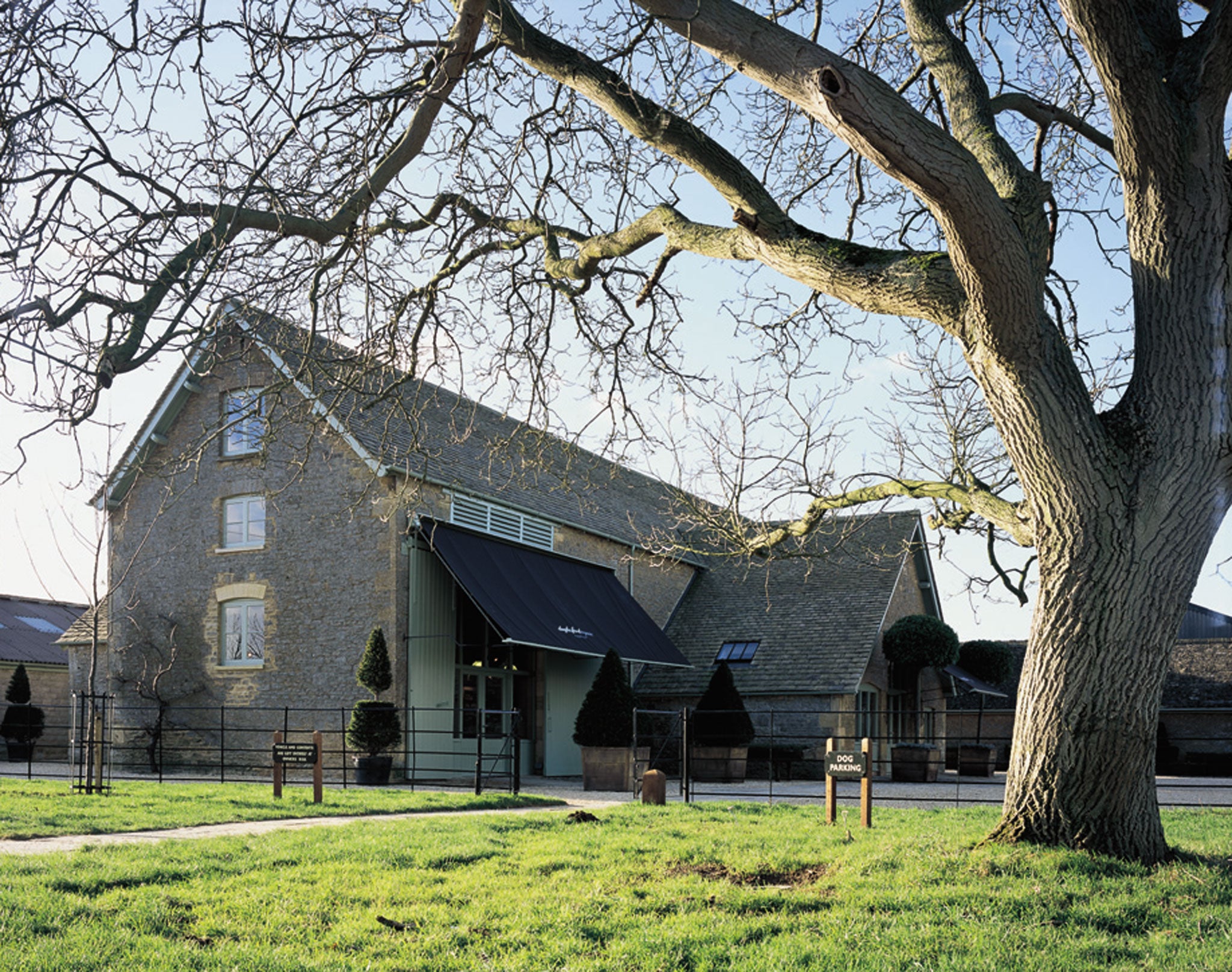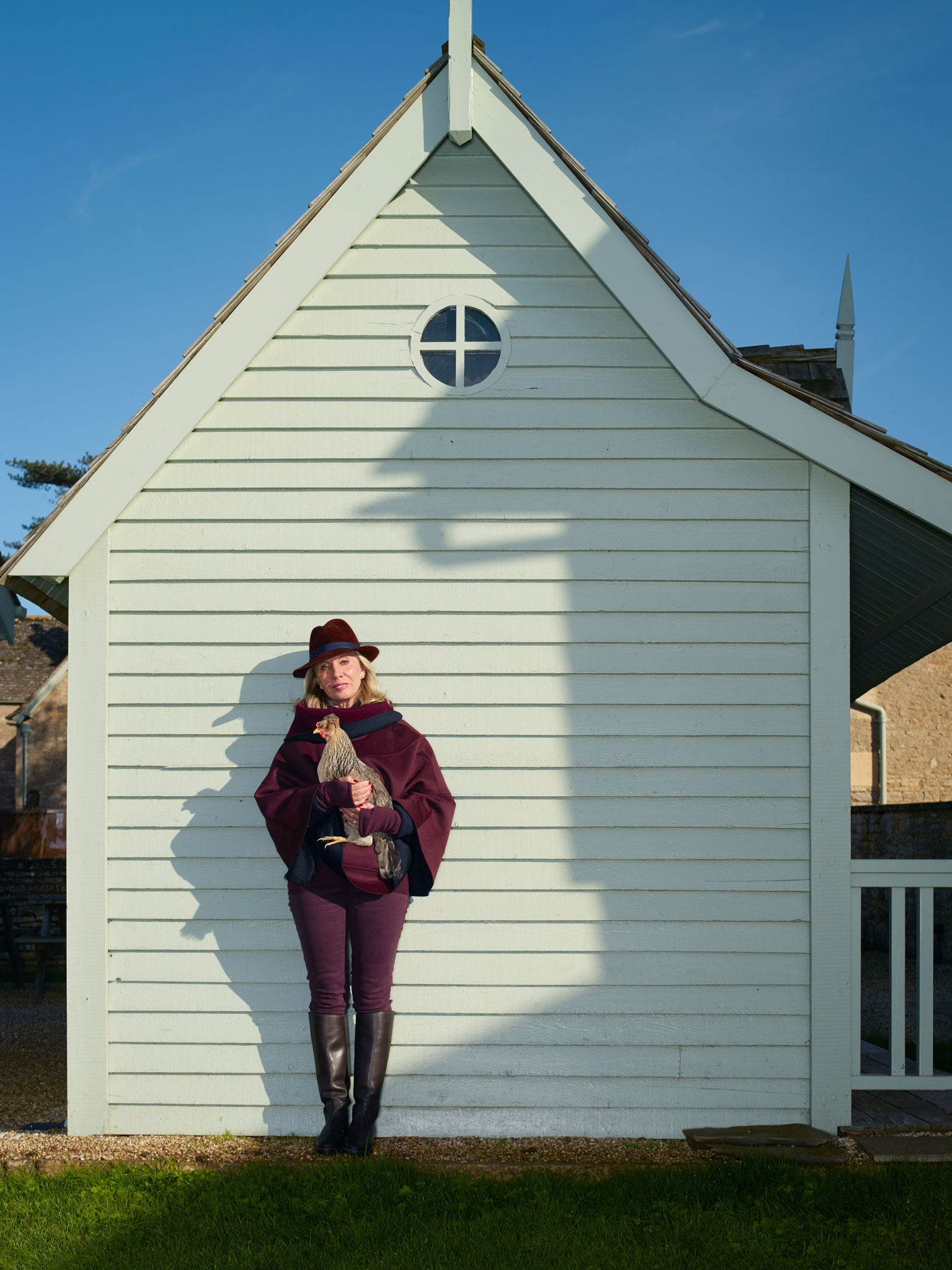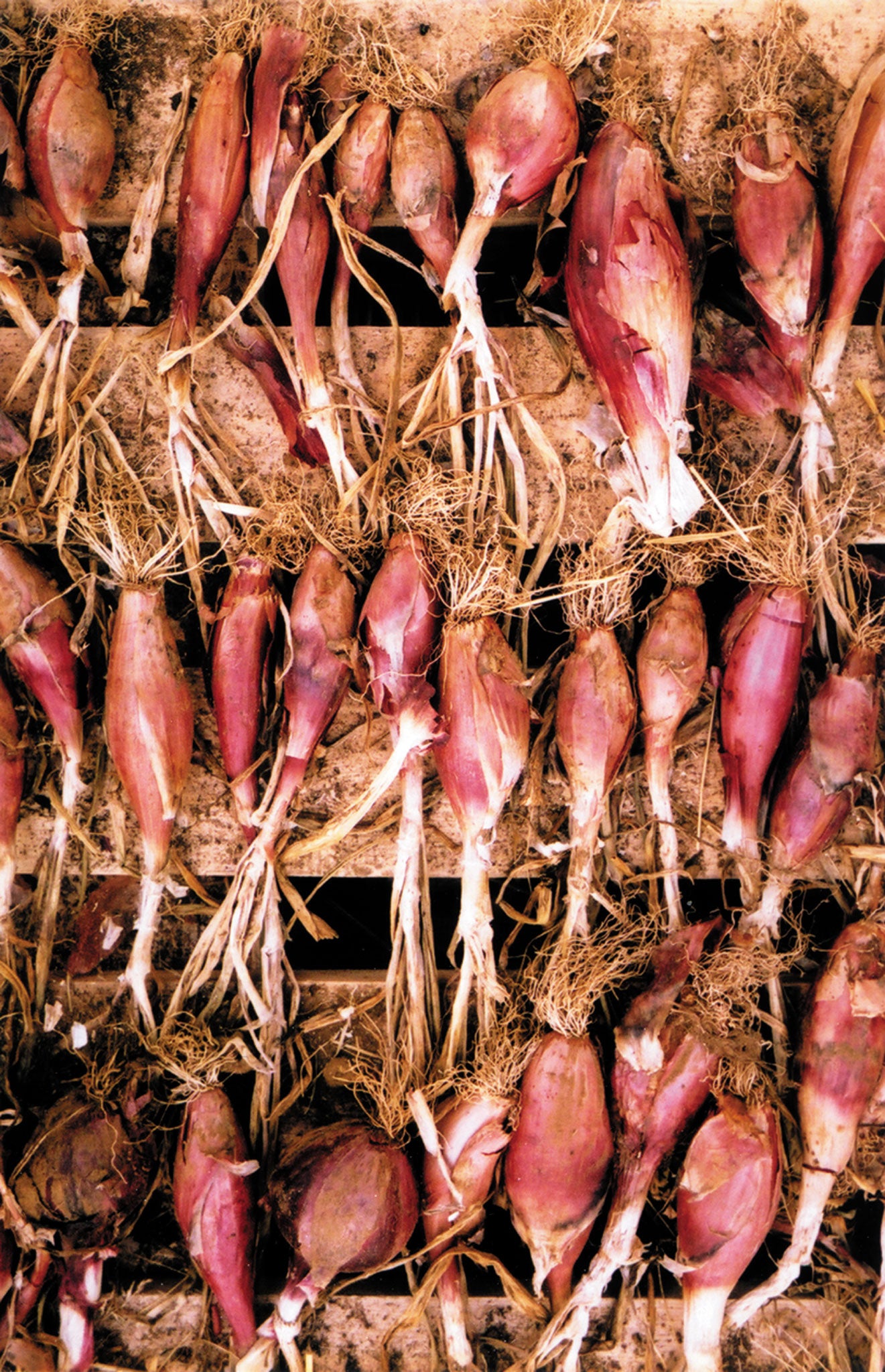The Independent's journalism is supported by our readers. When you purchase through links on our site, we may earn commission.
Planet Bamford: How Lady B became the high-priestess of organic good taste
When Carole Bamford first suggested farming her 4,000 acres organically, her husband – billionaire heir to the JCB digger business – wasn't convinced. Now he treats his horses homeopathically – and Lady B's Daylesford has become the nation's glossiest food empire
Your support helps us to tell the story
From reproductive rights to climate change to Big Tech, The Independent is on the ground when the story is developing. Whether it's investigating the financials of Elon Musk's pro-Trump PAC or producing our latest documentary, 'The A Word', which shines a light on the American women fighting for reproductive rights, we know how important it is to parse out the facts from the messaging.
At such a critical moment in US history, we need reporters on the ground. Your donation allows us to keep sending journalists to speak to both sides of the story.
The Independent is trusted by Americans across the entire political spectrum. And unlike many other quality news outlets, we choose not to lock Americans out of our reporting and analysis with paywalls. We believe quality journalism should be available to everyone, paid for by those who can afford it.
Your support makes all the difference.The view from Lady Bamford's Range Rover is flawless. We are at Daylesford, her 1,500-acre organic estate near Chipping Norton, where Carole is taking me on a tour. Herds of rare-breed sheep waft across Gainsborough-style parkland; silky black cows bed down in luxury straw. At the heart of it all is the farm shop, a series of converted limestone barns selling exquisitely wrapped cheese.
Daylesford is the cathedral of expensive good taste, and Lady Bamford is its high priestess. Those who come to worship here include the Prime Minister and his wife; Viscount Linley, chairman of Christie's auction house, who rents a cottage on the estate; and all the pop stars and Astors who have colonised these grey-green hills west of Oxford. There are two further outlets in west London, and a concession in Selfridges.
For all the cashmere and glamour, it's easy to overlook Carole's fundamental purpose, which is to produce high-quality, wholesome food at a low cost to the environment. She is singing from the same hymn sheet as the slow-food movement and the lentils-and-sandals brigade – only hers come from Prada.
Today, a glorious autumn light is shafting across the estate, bathing everything in a trippy, golden glow. Lady B, as her staff call her, doesn't normally give interviews, but she is passionate about food, and has taken the opportunity to spread the word about the importance of protecting the soil. We had met at the launch of the Daylesford cookbook, where she was so nervous about making a speech that she calmed herself down with a cigarette afterwards. "It's organic!" she insisted. We had a laugh and she eventually agreed to show me round Daylesford.
After posing with a day-old calf for our photographer, and being stampeded by a herd of sheep, we clamber into the car. "What would you like to see next?" she asks. "How about the pub?" I say. She giggles, and jams the stick into drive.
On the way, we talk about the origins of her love of food. "I grew up in the 1950s, and food was pretty scarce," she says. She is 67, but looks like a girl at the wheel of her vast car, a cavern of cream leather. "In those days," she continues, "an avocado was pretty unusual. My mother always cooked for four men, so she always had a stew in the oven, a brisket of beef or something, with dumplings."
Born Carole Whitt in Nottingham, she grew up in a male-heavy household: apart from her mother, there was her father, brother, uncle and grandfather." You did a lot of bartering in those days: you used to buy rabbits with the skin on, or an old cockerel. Buying food was fun. I'm not a great cook, but I'm a proper English family cook. I suppose I just learnt by osmosis."

Like her mother, Carole is very much a family woman. Next year, she will celebrate her 40th wedding anniversary with Anthony Bamford, whom she married aged 28, in 1974. They have three grown-up children: Alice, who has opened an organic restaurant in Malibu, and two sons, who help run the family business. Talk to anyone who knows them, and you'll hear two things: they're very close-knit, and all formidably hard-working. "Carole has a ferocious appetite for work," says Richard Smith, her farm manager. "They both do. They just never stop."
It has certainly paid off. Carole's father-in-law, Joseph Cyril Bamford, founded the digger manufacturer JCB in 1945; he passed the business to his son in 1975, and today, it is the world's third-largest manufacturer of construction equipment, and one of British manufacturing's few success stories: annual turnover is £2.7bn, and last year the company recorded record profits of £365m, up £10m on the year before. Lord Bamford commutes daily by helicopter to the factory in Staffordshire, and employs about 7,000 people.
Daylesford's accounts aren't quite so buoyant – in 2011, the business made a loss of £4.3m. But Carole doesn't see herself as a businesswoman, even though her business has won more than 120 awards since it launched in 2002. She is a major employer in this part of the Cotswolds, where jobs are hard to come by. There are 220 employees of Daylesford, across the farm, three shops and cafés, and at head office.
The Wild Rabbit in Kingham is her latest project. "It was a lovely Georgian pub that needed complete restoration, which I thoroughly enjoyed doing," she says. It opened in September, and was immediately dubbed "the poshest pub in Britain". Then again, I say, the Dowager Duchess of Devonshire has the Swan a couple of valleys away. "Yes, but I don't think you'll find her behind the bar pulling pints," she laughs. "Mind, I don't think I will be either."
Inside, it's buzzing with fresh-faced local staff. Alan the sous chef shows us a lentil and morteau sausage stew he is trying out to go with the legs of a mallard from a shoot at Wootton last week. "Four Bloody Marys please, Tom," she says to the barman (we have two PR girls in tow), "make them good ones." They are works of art, topped off with a stick of celery filled with wholegrain mustard.

We settle down in a booth and she reveals the secret of her success. "Detail, detail, detail. In retail, it's all about detail, and here as well. I choose each glass, each light bulb, each bottle of gin – everything!" She laughs. "Anal! And I'm in here most days, checking it out. I do everything, and I love doing it. It's a passion of mine."
Needless to say, it has already become the new canteen for the Chipping Norton set. "It is very social round here," Carole admits with a giggle. "More social than London, in a way. They all come in." As one Daylesford customer says to me: "It's the country without the compromise."
The only criticism levelled against the Wild Rabbit when it opened – and at Daylesford – is that it's all too perfect. Its London restaurants – in Pimlico and Notting Hill – are symphonies of white and grey, serving brunch to women wearing mainly grey and white. Beautiful young staff glide between small white tables bearing trays of delicious organic food, which is all grown here at the Gloucestershire mothership. "People don't really realise it all comes from the farm," she sighs. "We deliver to London from Daylesford every morning."
For many of her customers, shopping at Daylesford is as much about the lifestyle as the soil structure. But for Carole, it's still all about the food. She was one of the organic movement's earliest adopters, after having a Damascene conversion in 1977. "I remember it quite k clearly," she says. "It was a life-changing moment." She had just given birth to Alice, and was pushing her round the garden of their other home, Wootton, in Staffordshire, where they still farm a further 2,500 acres. "I had just got interested in gardening, and I was looking at the roses, and saw them wilting. When I got back to the house I asked them what they were spraying and they said, 'Roundup'. I said, 'Well, those roses don't like it,' and I was worried about what it might do to Alice."
A couple of weeks later, at the Royal Agricultural Show, where the Bamfords used to go every year to entertain clients for JCB, Carole found a lone man promoting organic food, "in a tent no bigger than this car. I pushed Alice in there and sat with this man for two hours talking about pesticides. And I just thought, what are we doing? We must look after the soil."
The hardest part was persuading her own husband. "He looked at me as if I was completely barmy." She giggles. "This was 36 years ago, you know. It would be expensive, and would mean the crops being less productive. It took three years. Actually, I think he paid me lip service for the first three, so it took six years in the end." Lord Bamford came round to it in the end, and is now as enthusiastic as Carole. "Ten years down the line, he was more organic than I was," she laughs. "He treats his animals with homeopathy."
In 1988, the Bamfords bought the Daylesford estate, which centres on an 18th-century house designed by Samuel Cockerell. Once home to Warren Hastings, the governor-general of Nebgal, it has always been a favourite with magnates. It belonged for a while to Lord Rothermere, and the Bamfords bought it from Baron Hans Heinrich Thyssen, the German steel heir. They immediately set about turning it organic, and it remains one of the biggest organic estates in the south of England. It's also one of the best-maintained. On the drive back from Kingham, you can tell where the local farm stops and Daylesford starts by the cut of the hedge.

The creation of Daylesford Organics was never part of Carole's plan. "I never intended to have a business," she says. "Or a brand. People say, 'You've created a brand.' I say, 'Oh God, have I?' I just started with an idea. If I had asked my father-in-law, when he made the first digger, he wouldn't have told you he wanted to make a brand either." It started for Carole with cheese. She found a cheese-maker through a specialist magazine; its editor happened to live in Chippy, and they started making cheese in a barn. "So you're a rival to Alex James?" I say. "No! Alex is my friend. Anyway, I don't think he makes his cheese from his own milk."
Then came the meat, and gradually the vegetables; then it seemed sensible to open a shop. "There was this barn in a field, and I said to Anthony, can I turn it into a shop, and he said I could. But as we were approaching opening day just before Christmas 2002, I was so worried nobody would turn up that I took a little shop in Moreton [in-Marsh]. But they did all turn up. Hundreds of them, and Japanese coachloads!"
Carole insists she's not a businesswoman, and maybe philanthropist is a better description. The cook Rose Prince recently described how Carole helped turn around the life of her teenage son Jack, who had been expelled from school and was struggling to make his way. He had trained as an apprentice baker, and after giving a breadmaking demonstration at Daylesford, Carole offered him a job in her wholesale bakery. "That was a truly monumental breakthrough," he said. "I learnt so much at Daylesford that I was determined to pursue a career as a baking entrepreneur. I got a renewed sense of values, particularly for money. Baking was a constant in my life, whereas school had not been."
Carole also helped launch the career of Tom Aikens, who worked as her chef before getting his first Michelin star, and then Tom Kitchin, who worked for her for three years. "They learn about ingredients. If they come to me, I say, 'Can you shop?' Forget the cooking. If you can do the simplest thing, using the best ingredients, that's what I want." Her work has not gone unnoticed. In 2006, Carole was named Personality of the Year at the Food and Farming awards and made an OBE for services to children and families. In June 2012, she was honoured with an International Leadership Award at the Global Green Millennium Awards. "I just have a passion," she says, "and I like to see it in others."
After our drinks, we are supposed to part ways, but when we get back to the farm shop, Carole calls me back. She wants to show me her black radishes, a beautiful apple-sized turnip dating back to the 16th century, properly known as the Black Spanish Round. "Here, try this," she says, plucking one from the display and rushing behind the deli counter to cut me a slice. "Delicious with sea salt and a glass of prosecco!"
I'm suddenly reminded of something Carole said in the pub. "It's important not to be a bore about organic food, otherwise it just has the opposite effect. You've got to be able to have fun as well." And what could say it better than radishes with prosecco?
For more: daylesford.com
Join our commenting forum
Join thought-provoking conversations, follow other Independent readers and see their replies
Comments